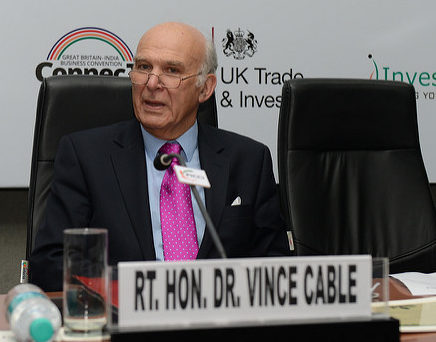The EU should begin making contingency plans for a second EU referendum in the UK, the Liberal Democrat leader Sir Vince Cable says.
Sir Vince met Michel Barnier in Brussels last week and told him that support for a ‘People’s Vote’ on the terms of the UK’s departure from Europe was steadily growing.
He and Ian Blackford from the SNP, Liz Saville Roberts from Plaid Cymru and Molly Scott Cato from the Green Party told Mr Barnier that MPs backing a new vote were “the biggest bloc” in Westminster.
Prime Minister Theresa May has ruled out any second referendum, but pressure is growing on her as her ‘Chequers plan’ continues to meet stiff opposition from all parties.
She said a new vote on any withdrawal agreement would be a “gross betrayal of our democracy” and has urged politicians to focus on securing the best Brexit deal for Britain instead.
After their hour-long meeting, Mr Barnier and the UK delegation issued a joint statement which claims the current Brexit plans had no majority in Parliament.
They accused Jeremy Corbyn’s Labour Party of “waving through” a “destructive Brexit” and said there was cross-party consensus on a new referendum.
Sir Vince said: “My message to Michel Barnier was clear: it’s time to start serious contingency planning for a ‘people’s vote’.
“We know the UK government has started making such plans as a result of the growing demand for such a vote, demonstrated by last weekend’s march.
“The EU should do the same, because MPs who back the people’s vote are fast forming the biggest and most cohesive bloc in Westminster.”
Around 650,000 people marched in support of a ‘People’s Vote’ last week and campaigners behind it say voters should get a choice between leaving with or without a deal or staying on current terms.
Jeremy Corbyn had ruled out another EU referendum, but now says he will respect the result of any new vote if Parliament cannot reach agreement on the outcome of Brexit talks.
A small number of Tory backbenchers, including Heidi Allen and Anna Soubry, have come out in support of another referendum.
The British public voted to leave the EU by a margin of 51.89% to 48.11% in a referendum in June 2016.
The UK is due to leave the EU on March 29, 2019, under the terms of the Article 50 process after the electorate voted by 51.89 per cent to 48.11 per cent for Brexit in June 2016.




